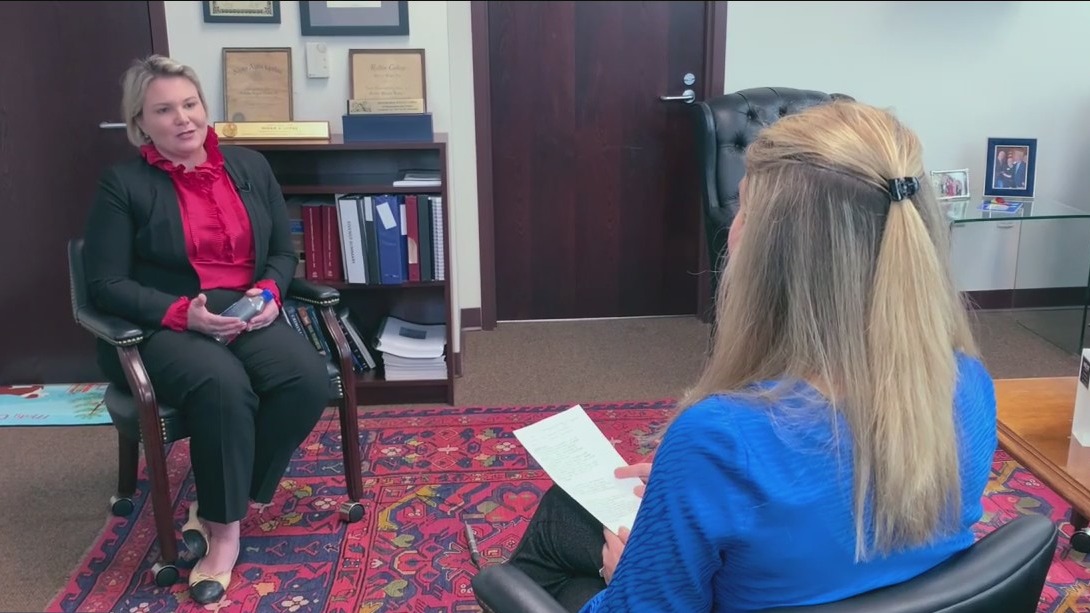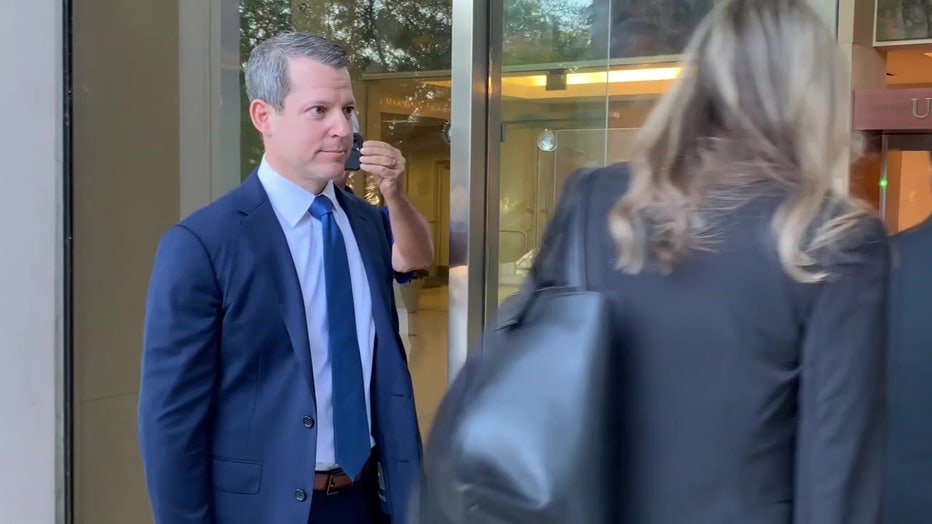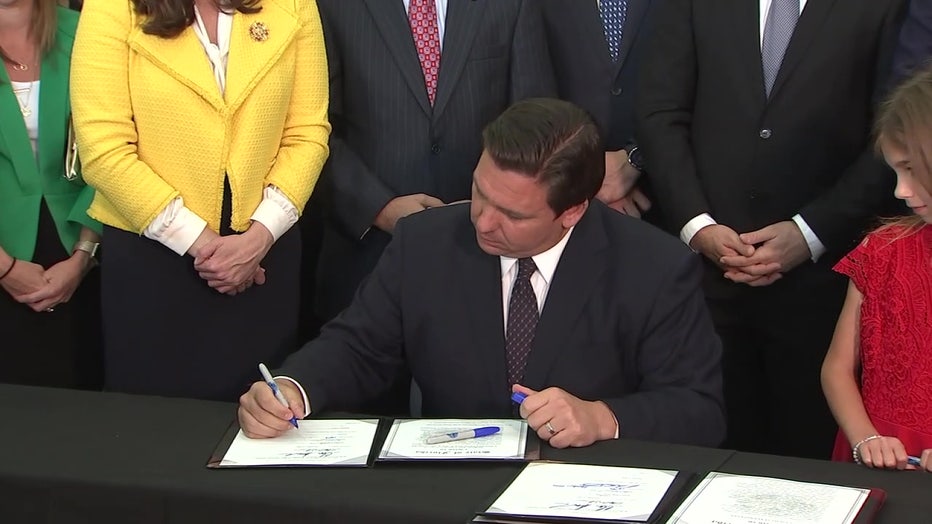Gov. Ron DeSantis to challenge Andrew Warren ruling

Deadline looms for DeSantis to respond to Warren ruling
PREVIOUS COVERAGE: Wednesday is the deadline for Gov. Ron DeSantis to ask for the 11th Circuit Court of Appeal to have a second look at their ruling that affirmed the lower courts ruling that affirmed the lower courts authority to reinstate ousted Hillsborough State Attorney Andrew Warren.
TALL - Gov. Ron DeSantis plans to ask a full federal appeals court to take up a battle about his suspension of Hillsborough County State Attorney Andrew Warren, after a panel of the court backed Warren on key issues.
Lawyers for DeSantis filed a document late Wednesday at the 11th U.S. Circuit Court of Appeals that made clear they will seek what is known as an "en banc" hearing before the full court. The document was filed to oppose a motion by Warren’s attorneys aimed at speeding up the case.
The three-judge panel of the Atlanta-based court this month vacated a decision by U.S. District Judge Robert Hinkle that allowed Warren’s suspension to stand. The panel’s ruling said the suspension violated First Amendment protections in a series of ways and ordered Hinkle to look again at whether DeSantis had legitimate policy grounds to oust the twice-elected prosecutor.
Warren’s attorneys last week filed a motion to expedite a "mandate," which is a formal step of sending the case back to Hinkle.
But lawyers for DeSantis in the document Wednesday said Warren’s motion should be denied — and appeared to suggest the dispute eventually could go to the U.S. Supreme Court. After issuing the suspension in August 2022, DeSantis replaced Warren with Susan Lopez, a former county court judge.

Susan Lopez continues work despite Warren v. DeSantis trial
For 118 days, acting Hillsborough State Attorney Susan Lopez has served in the role appointed to her by Florida Governor Ron DeSantis. She maintained that her office has operated independently from day one as the legal showdown between suspended State Attorney Andrew Warren and the governor continues to play out in Tallahassee.
"In no event should the (11th Circuit) Court issue the mandate before the en banc and Supreme Court process has played out," the response said. "If the district court (Hinkle) reinstates Mr. Warren only to have the en banc (11th Circuit) Court or the Supreme Court later recall the mandate, the district court’s initial judgment would be revived and Mr. Warren would be suspended yet again. That would flip the leadership of Hillsborough County’s State Attorney’s Office for a third time in less than two years."
In last week’s motion to expedite the mandate, however, Warren’s attorneys wrote that "time is of the essence."
RELATED: Andrew Warren: Ousted Hillsborough state attorney will not seek reelection
"As a result of Governor DeSantis’ illegal suspension of Mr. Warren, the voters of Hillsborough County have been deprived of the official whom they selected as state attorney," the motion said. "An election involving millions of Floridians has been nullified. Mr. Warren, meanwhile, has been unable to serve in his post. One year remains in Mr. Warren’s term, and it should not be consumed by unnecessary delays in legal proceedings."
In suspending Warren, DeSantis accused the Democrat of "incompetence and willful defiance of his duties." DeSantis’ executive order, in part, pointed to Warren signing a national organization’s statement about refraining from prosecuting abortion cases.

Full press conference: Florida Gov. DeSantis announces suspension of Hillsborough State Attorney Andrew Warren
Florida Gov. Ron DeSantis and Attorney General Ashley Moody announced the suspension of Hillsborough State Attorney Andrew Warren, effective immediately, for refusing to enforce Florida law.
The governor also targeted Warren for signing a statement that criticized laws restricting care for transgender people. In addition, DeSantis cited Warren policies that could limit prosecution of cases related to bicycle and pedestrian stops by police and certain low-level offenses.
Warren filed a lawsuit, arguing that the suspension violated his First Amendment rights. Hinkle considered a series of issues about DeSantis’ motivations for issuing the suspension.
Hinkle found that the First Amendment protected Warren on two factors — his political affiliations and advocacy for criminal-justice reform, the appeals-court panel ruling said. Nevertheless, he concluded that DeSantis would have suspended Warren based on other factors that were not protected by the First Amendment.
But the appeals-court panel ruled that two of those other factors were protected by the First Amendment. One of those factors was consideration of the statement that Warren signed about abortion. The other factor was DeSantis’ "anticipated political benefit from suspending a progressive prosecutor," the panel ruling said.

Andrew Warren says his removal was illegal and is fighting in court to regain his position as Hillsborough state attorney.
The panel said the First Amendment protects Warren from decisions based "solely on political benefit." It said facts in the case showed that "DeSantis based Warren’s suspension on his reputation as a ‘reform prosecutor.’ DeSantis’s political benefit was solely derived from Warren’s political ideology."
In deciding to send the case back to Hinkle for reconsideration, the panel directed him to look at other motivations that DeSantis asserted in the suspension — the issues related to limiting prosecution of cases related to bicycle and pedestrian stops by police and certain low-level offenses.
While the document filed Wednesday did not detail arguments DeSantis would make to the full appeals court, it cited legal questions about "whether an official’s statements of future conduct can justify a retaliation claim, whether elected officials may sue for retaliation based on political ideology, and what the proper standard is for discerning whether speech was made pursuant to official duties."

File: Ron DeSantis
The panel’s decision came days after Warren announced that he would not try to regain the state attorney’s post in the November election. The announcement said he decided not to enter the race "following an assessment that showed a high risk" that DeSantis "would simply repeat his illegal suspension of Warren" and replace him.
But in the motion filed last week, Warren’s attorneys raised the possibility that he could run again in November.
"The urgency is all the greater now because resolution of this case will also impact the next election for state attorney later this year," the motion said. "Mr. Warren’s decision about whether to run for reelection as state attorney depends in significant part on the outcome of this litigation."

